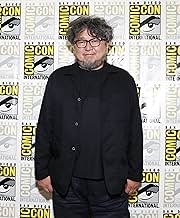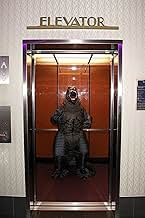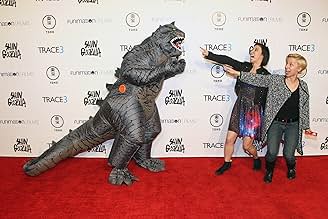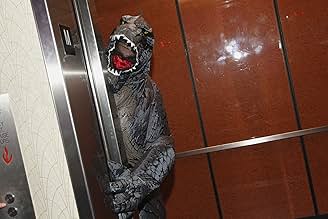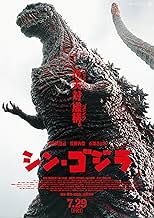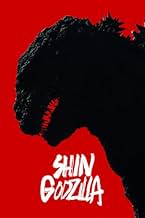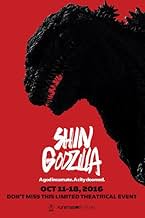Após um acidente na baía de Tóquio, uma criatura gigante chamada Godzilla aterroriza todo o Japão.Após um acidente na baía de Tóquio, uma criatura gigante chamada Godzilla aterroriza todo o Japão.Após um acidente na baía de Tóquio, uma criatura gigante chamada Godzilla aterroriza todo o Japão.
- Direção
- Roteiristas
- Artistas
- Prêmios
- 13 vitórias e 10 indicações no total
- Direção
- Roteiristas
- Elenco e equipe completos
- Produção, bilheteria e muito mais no IMDbPro
Avaliações em destaque
'Shin Godzilla' isn't Toho's vainglorious attempt at re-capturing the success of recent Hollywood adaptations of its iconic Japanese monster. Quite the contrary, co-directors Hideaki Anno and Shinji Higuchi know better than try to outdo their Western counterparts in terms of spectacle, and instead have made the astute decision to make a distinctly Japanese 'Godzilla' that will most certainly resonate with their home audience, even at the expense of alienating some non-Japanese viewers without the same cultural or historical context. In fact, we dare say that their film has the unique distinction of being both political allegory as well as real-world horror, and is surprisingly effective on either count.
No other recent event has been so seared in the Japanese consciousness as that of the 2011 Tohoko earthquake and tsunami as well as the consequent Fukushima nuclear disaster, not just because of the hundreds of thousands of people affected but also because it exposed how terribly unprepared the Japanese government was with handling a crisis of such proportions. The parallels here are unmistakable – from an indecisive Prime Minister (Ren Ôsugi) to the frustratingly bureaucratic attitude of his Cabinet ministers to the embarrassing revelation of his poor judgment (such as during a live press conference where Godzilla makes landfall right after he specifically tells the people that the creature will not) – and indeed meant no less than a searing indictment of just how inept the Naoto Kan's administration was during 3/11.
Yet it isn't hard to imagine how a movie based solely on such criticism would quickly turn monotonous, not least because the lead characters here are all political/ Government figures – among them, Hiroki Hasegawa's outspoken and gutsy Deputy Chief of Cabinet Secretary Rando Yaguchi, Yutaka Takenouchi's opportunistic Aide to the Prime Minister Hideki Akasaka, and Satomi Ishihara's Special Envoy for the United States Kayoko Ann Patterson – and each is defined only in terms of his or her role and ambition in relation to the ongoing calamity. None too subtle is the point, emphatically and unequivocally made, that while politicians wield the ingenuity and authority it takes to manage an unprecedented catastrophe, each is also simultaneously weighting the cost or opportunity of every decision or maneuver to his or her political futures.
Just as illuminating, especially to the Japanese, is the strengths or limits of its military might post-WWII, seeing as how it has never yet seen the need to invoke the use of its Self-Defense Forces (SDF) or call in the help of the US military under the US-Japan Security Treaty. Under the pretense of exterminating Godzilla, Anno's screenplay imagines what it would take not just for the SDF to be activated but also how US intervention would likely come with some strings attached. How and if at all it is meant to play into the current Shinzo Abe's push for an expansion of the SDF role is quite perceptively left up to the audience's interpretation, but there is no doubting that the introduction of the United Nations late into the film is meant to demonstrate how powerless nations not on its Security Council may be to resolutions passed by its five members on non-member countries.
Yes, if it isn't yet clear, there is no intent here to highlight the human dimension of such an event; rather, it is domestic politics as well as the global world order that forms the basis of this re- incarnation of Godzilla. As a reboot, 'Shin Godzilla' starts on a clean slate, beginning with an underwater disturbance that briefly makes its way onto shore before going back out to sea, then returning as a much more highly evolved organism that grows and grows ever more fearsome. Fans though will not be disappointed – as with past iterations of Godzilla, this latest version not only has the ability to radiate highly destructive atomic rays from its dorsal fins, it also can set streets of buildings ablaze by spewing fire out of its mouth. It does take time to get used to the new 'ShinGoji' design, but rest assured that this beast is every bit as terrifying as it should be.
In fact, that palpable sense of fear is twofold – first, in tying the origins of Godzilla to Japan's ignominious nuclear history; and second, in showing with utmost realism the wanton destruction of notable landmarks in Tokyo by the monster. The former has to do as much with the United States' alleged dumping of radioactive waste in Tokyo Bay in the 1950s and 1960s as accusations of Japan's own disposal of toxic ash from the burning of Fukushima's nuclear waste into the same waters. The latter, on the other hand, sees entire districts in Tokyo ripped or flattened by Godzilla's rampage, impressively staged by co-director cum VFX supervisor Anno (also known for last summer's 'Attack of Titan') using a mix of old- fashioned puppetry and modern CGI. In particular, the combined US- Japan military assault on Godzilla along the banks of the Kano River and the finale in downtown Shinjuku is stunning, especially in imagining the magnitude of destruction that Godzilla could inflict on modern-day Japan.
Yet if the promotional materials have given the impression that 'Shin Godzilla' is an action-packed blockbuster like its most recent Hollywood predecessors, you'll do best to temper those expectations. Sure, there are beautiful sequences of Godzilla wreaking havoc, but because the focus is on displaying different types of political personalities and their responses towards such a crisis of proportions, there is a lot of talking (as well as 'talking heads') throughout the film and especially in the beginning. By tapping into the paranoia, fear and frustration of their fellow Japanese following their own recent real-life crises, Anno and Higuchi have made a contemporary 'Godzilla' that is sure to roar loud with their home crowd – and by that count, this is as its Japanese title suggests, a new and true incarnation as relevant as it is frightening.
No other recent event has been so seared in the Japanese consciousness as that of the 2011 Tohoko earthquake and tsunami as well as the consequent Fukushima nuclear disaster, not just because of the hundreds of thousands of people affected but also because it exposed how terribly unprepared the Japanese government was with handling a crisis of such proportions. The parallels here are unmistakable – from an indecisive Prime Minister (Ren Ôsugi) to the frustratingly bureaucratic attitude of his Cabinet ministers to the embarrassing revelation of his poor judgment (such as during a live press conference where Godzilla makes landfall right after he specifically tells the people that the creature will not) – and indeed meant no less than a searing indictment of just how inept the Naoto Kan's administration was during 3/11.
Yet it isn't hard to imagine how a movie based solely on such criticism would quickly turn monotonous, not least because the lead characters here are all political/ Government figures – among them, Hiroki Hasegawa's outspoken and gutsy Deputy Chief of Cabinet Secretary Rando Yaguchi, Yutaka Takenouchi's opportunistic Aide to the Prime Minister Hideki Akasaka, and Satomi Ishihara's Special Envoy for the United States Kayoko Ann Patterson – and each is defined only in terms of his or her role and ambition in relation to the ongoing calamity. None too subtle is the point, emphatically and unequivocally made, that while politicians wield the ingenuity and authority it takes to manage an unprecedented catastrophe, each is also simultaneously weighting the cost or opportunity of every decision or maneuver to his or her political futures.
Just as illuminating, especially to the Japanese, is the strengths or limits of its military might post-WWII, seeing as how it has never yet seen the need to invoke the use of its Self-Defense Forces (SDF) or call in the help of the US military under the US-Japan Security Treaty. Under the pretense of exterminating Godzilla, Anno's screenplay imagines what it would take not just for the SDF to be activated but also how US intervention would likely come with some strings attached. How and if at all it is meant to play into the current Shinzo Abe's push for an expansion of the SDF role is quite perceptively left up to the audience's interpretation, but there is no doubting that the introduction of the United Nations late into the film is meant to demonstrate how powerless nations not on its Security Council may be to resolutions passed by its five members on non-member countries.
Yes, if it isn't yet clear, there is no intent here to highlight the human dimension of such an event; rather, it is domestic politics as well as the global world order that forms the basis of this re- incarnation of Godzilla. As a reboot, 'Shin Godzilla' starts on a clean slate, beginning with an underwater disturbance that briefly makes its way onto shore before going back out to sea, then returning as a much more highly evolved organism that grows and grows ever more fearsome. Fans though will not be disappointed – as with past iterations of Godzilla, this latest version not only has the ability to radiate highly destructive atomic rays from its dorsal fins, it also can set streets of buildings ablaze by spewing fire out of its mouth. It does take time to get used to the new 'ShinGoji' design, but rest assured that this beast is every bit as terrifying as it should be.
In fact, that palpable sense of fear is twofold – first, in tying the origins of Godzilla to Japan's ignominious nuclear history; and second, in showing with utmost realism the wanton destruction of notable landmarks in Tokyo by the monster. The former has to do as much with the United States' alleged dumping of radioactive waste in Tokyo Bay in the 1950s and 1960s as accusations of Japan's own disposal of toxic ash from the burning of Fukushima's nuclear waste into the same waters. The latter, on the other hand, sees entire districts in Tokyo ripped or flattened by Godzilla's rampage, impressively staged by co-director cum VFX supervisor Anno (also known for last summer's 'Attack of Titan') using a mix of old- fashioned puppetry and modern CGI. In particular, the combined US- Japan military assault on Godzilla along the banks of the Kano River and the finale in downtown Shinjuku is stunning, especially in imagining the magnitude of destruction that Godzilla could inflict on modern-day Japan.
Yet if the promotional materials have given the impression that 'Shin Godzilla' is an action-packed blockbuster like its most recent Hollywood predecessors, you'll do best to temper those expectations. Sure, there are beautiful sequences of Godzilla wreaking havoc, but because the focus is on displaying different types of political personalities and their responses towards such a crisis of proportions, there is a lot of talking (as well as 'talking heads') throughout the film and especially in the beginning. By tapping into the paranoia, fear and frustration of their fellow Japanese following their own recent real-life crises, Anno and Higuchi have made a contemporary 'Godzilla' that is sure to roar loud with their home crowd – and by that count, this is as its Japanese title suggests, a new and true incarnation as relevant as it is frightening.
"Shin Godzilla" is a far departure from the usual Godzilla movie. With a darker tone and vastly different design of the titular monster, this movie isn't afraid to set itself aside from the more traditional monster movie, focusing more on the political side of things. While I at first thought this was unnecessary, it's important to note that this film was a representation of Japanese tragedies. Similar to how the original film was representative of the nuclear bombings of Japan, this film is representative of the Fukushima Daiichi nuclear disaster and the 2011 Tohoku earthquake, events heavily involved in political controversy. This isn't a perfect movie in any way, but I admire that bold steps it took to change. Honestly, probably one of the best Godzilla movies.
This is an excellent show that differs from the standard hack-and- slash and action-driven natures of other recent films (Independence Day 2 etc.). It is one of the most narrative-driven films that I've watched in the last 2 years.
PROS:
CONS
CONCLUSION:
PROS:
- The acting was great as a whole, comprising of much seriousness and focus, typical of the exigency of a nation-wide disaster, in the top politicians of the diet.
- It is full of political irony, satire of the Japanese government's and bureaucracy's indecision and red-taping. There is great intelligence imbued into movie, and it shows that much research has been done prior to filming. It also shows the way in which foreign and indigenous affairs have been interwoven together in governmental decision-making. I greatly appreciate this as a whole, as the narration is full of meaning and subtlety.
- The special effects of Godzilla were absolutely wonderful, portraying both scale and grandeur in Godzilla's size and style. I greatly enjoyed the four main scenes where Godzilla made its appearance, especially its climax at the latter two.
- The pacing was fast-paced, and little time was wasted. A lot of content had been packaged into a duration of just 120 minutes. While watching, I thought that the film lasted for 4 hours, as there were so many occurrences!
- The style and pace also remains true to the original Godzilla classics. So is the provenance of Godzilla.
CONS
- Ishihara would not have fooled us into thinking that she is a Japanese-American English speaker!
- Overall, it is very dialogue-heavy. This is both a strength and weakness. A strength as there is much character development, but also excessive to the point that it sometimes can be dreary and draggy. This is the greatest setback of the film, and could have been further streamlined. Minus 1 star for this.
CONCLUSION:
- As a whole, I rate it 9 out of 10, and will watch it again.
- Most people who have an appreciation for subtlety and nuance, and also of vivid storytelling will like this film.
- However, those who prefer a CGI roller-coaster like Independence Day 2 or 2012 may be turned off by the extremely heavy dialogue.
After waiting for a whole year, I finally got my hands on the award-winning Japanese film "Shin Godzilla", directed by Hideaki Anno (Evangelion) and Shinji Higuchi (live action Attack On Titan). With the praise this film got, did it live up to the hype for me? Yes and to an extent no.
The film is a modern-day remake, showing how would the Japanese government (and to an extent other governments) react if Godzilla showed up for the first time today. This film is one of the more politically-charged entries in the franchise and is more of a thriller than a straight-up monster movie. There are lots of characters, a majority of which don't have much personality, but the main ones like protagonist Rando I found myself latching on to. Some the best scenes are when the characters stop acting like politicians and have casual and occasionally humorous dialogue. At least they took the whole situation very seriously with rarely an over-the-top moment much like the 2014 film, a breath of fresh air within the franchise. There's also this mystery element that plays a huge part in the story which I liked very much. Just as the 1954 film was a metaphor for Hiroshima and Nagasaki, this one reflects the Fukushima meltdown as well as the tsunami and earthquake Japan suffered a few years back (goes to show that Godzilla will always find a way to stay relevant).
How does Big G himself hold up? Pretty good. His design is more-or-less an update of his original 1954 look, his skin looking like radiation scars. New to the series is that Godzilla EVOLVES throughout, starting out smaller and very odd-looking but growing larger, more powerful, and even smarter as the story progresses, making him unpredictable. I also enjoyed the exploration of his biology, that is how this creature could exist. My complaints fall under a few things, strictly on his main form: his arms are too small and he isn't very expressive, mostly just lumbering along in a straight line. When he does gets mad, however, that's when he really shines. The action scenes are entertaining enough and there's plenty of destruction featured with some surprising moments here and there. The special effects are largely CGI with elements of practical effects, both of which are good; Big G isn't a man in a suit this time (kinda disappointing) but rather motion capture, though there are a few well-done miniatures. Some sound effects are of the old era and the music is a mix of the original's by Akira Ifukube with some new ones by Shiro Sagisu, a lovely combo. There's even a track from Evangelion (Decisive Battle).
My favorite scene: The first time Godzilla uses his atomic breath. Set at night with a mournful choir singing in the background (w/ English lyrics), the suspense that builds to the monster unleashing his power and rage upon the world was epic, chilling even, and has tremendous payoff. It's a truly apocalyptic image.
There are a few issues to address. I admit the pacing isn't the best. The beginning particularly has some rapid editing and there are texts on the screen throughout (often naming a character and political position) that are quite distracting and take getting used to, though I suppose you're supposed to feel as rushed as these politicians. Also, there's a huge gap before the climax where there's no action going on that I honestly think the filmmakers should have cut down a little. I like the characters and what's happening to them, but I would have preferred for the film to cut to the chase a bit.
Overall, this movie has its faults for sure, but I'm still glad I saw it. It was an interesting twist to my favorite fictional character. More films in both Japan and America are on the way and I can't wait. Long live the King of the Monsters!
The film is a modern-day remake, showing how would the Japanese government (and to an extent other governments) react if Godzilla showed up for the first time today. This film is one of the more politically-charged entries in the franchise and is more of a thriller than a straight-up monster movie. There are lots of characters, a majority of which don't have much personality, but the main ones like protagonist Rando I found myself latching on to. Some the best scenes are when the characters stop acting like politicians and have casual and occasionally humorous dialogue. At least they took the whole situation very seriously with rarely an over-the-top moment much like the 2014 film, a breath of fresh air within the franchise. There's also this mystery element that plays a huge part in the story which I liked very much. Just as the 1954 film was a metaphor for Hiroshima and Nagasaki, this one reflects the Fukushima meltdown as well as the tsunami and earthquake Japan suffered a few years back (goes to show that Godzilla will always find a way to stay relevant).
How does Big G himself hold up? Pretty good. His design is more-or-less an update of his original 1954 look, his skin looking like radiation scars. New to the series is that Godzilla EVOLVES throughout, starting out smaller and very odd-looking but growing larger, more powerful, and even smarter as the story progresses, making him unpredictable. I also enjoyed the exploration of his biology, that is how this creature could exist. My complaints fall under a few things, strictly on his main form: his arms are too small and he isn't very expressive, mostly just lumbering along in a straight line. When he does gets mad, however, that's when he really shines. The action scenes are entertaining enough and there's plenty of destruction featured with some surprising moments here and there. The special effects are largely CGI with elements of practical effects, both of which are good; Big G isn't a man in a suit this time (kinda disappointing) but rather motion capture, though there are a few well-done miniatures. Some sound effects are of the old era and the music is a mix of the original's by Akira Ifukube with some new ones by Shiro Sagisu, a lovely combo. There's even a track from Evangelion (Decisive Battle).
My favorite scene: The first time Godzilla uses his atomic breath. Set at night with a mournful choir singing in the background (w/ English lyrics), the suspense that builds to the monster unleashing his power and rage upon the world was epic, chilling even, and has tremendous payoff. It's a truly apocalyptic image.
There are a few issues to address. I admit the pacing isn't the best. The beginning particularly has some rapid editing and there are texts on the screen throughout (often naming a character and political position) that are quite distracting and take getting used to, though I suppose you're supposed to feel as rushed as these politicians. Also, there's a huge gap before the climax where there's no action going on that I honestly think the filmmakers should have cut down a little. I like the characters and what's happening to them, but I would have preferred for the film to cut to the chase a bit.
Overall, this movie has its faults for sure, but I'm still glad I saw it. It was an interesting twist to my favorite fictional character. More films in both Japan and America are on the way and I can't wait. Long live the King of the Monsters!
This movie, hands down, is one of the best representations of Godzilla. I recommend you watch in sub for the best experience because the audio mixing isn't the greatest for the English dub, and trust me, it's noticeable. Suck it up if you don't like to read. I mean, you're reading now, aren't you? Godzilla ultimately steals the show, and you'd hope so from a Godzilla movie. The visuals at times can be shoddy, but in the scenes where the lighting is just right, it's a glorious moment to behold truly horrifying visuals (in a good way). The plot, however, is where it kind of suffers the most for me.
Five Godzilla Movies You Need to Watch
Five Godzilla Movies You Need to Watch
Celebrate Shin Godzilla returning to theaters with a look at some of our favorite Godzilla movies.
Você sabia?
- CuriosidadesFor Satomi Ishihara, who plays a Japanese-American diplomat, the hardest part of her performance was learning English. She found out she was playing an American after being cast, and was shocked by the amount of the English dialogue she had to speak when she read the script.
- Erros de gravaçãoThe drug that the government uses to kill Godzilla is described as something that will "disable his internal cooling system". After the drug is used at the end, Godzilla freezes. If the drug was supposed to disable his internal cooling system, it would have overheated him, not frozen him. But it's a bit more complex than that... In fact, in the movie the drug actually does manage to disable Godzilla's cooling system, but in stead of overheating him this triggers a SCRAM-shutdown (=Safety Control Rods Activation Mechanism) as a kind of involuntarily overreaction-thus freezing him in the procedure. By freezing himself temporarily, Godzilla is able to survive this potentially critical trauma.
- Citações
Hiromi Ogashira, Deputy Director of Nature Conservation Bureau: Man is more frightening than Gojira.
- Cenas durante ou pós-créditosThe Toho logo appears as the 1950s color version to homage Godzilla (1954)'s era.
Godzilla's stomping and roar is heard, which also happened in Godzilla (1954).
- Trilhas sonorasPersecution of the Masses
Written by Shirô Sagisu
Lyrics by Mike Wyzgowski
Soprano vocals performed by Catherine Bott
Alto and Mezzo-Soprano vocals performed by Deborah Miles-Johnson
Tenor vocals performed by Andrew Busher
Bass vocals performed by Michael George
Orchestra by London Studio Orchestra
Principais escolhas
Faça login para avaliar e ver a lista de recomendações personalizadas
Detalhes
- Data de lançamento
- País de origem
- Centrais de atendimento oficiais
- Idiomas
- Também conhecido como
- Godzilla Resurgence
- Locações de filme
- Empresas de produção
- Consulte mais créditos da empresa na IMDbPro
Bilheteria
- Faturamento bruto nos EUA e Canadá
- US$ 4.402.082
- Fim de semana de estreia nos EUA e Canadá
- US$ 458.342
- 16 de out. de 2016
- Faturamento bruto mundial
- US$ 80.536.824
- Tempo de duração
- 2 h(120 min)
- Cor
- Proporção
- 2.39 : 1
Contribua para esta página
Sugerir uma alteração ou adicionar conteúdo ausente






